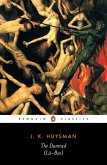"Là-bas" is a novel by Joris-Karl Huysmans, first published in 1891. The story follows the disillusioned and decadent Parisian writer, Durtal, as he becomes obsessed with the life and deeds of the infamous 15th-century serial killer Gilles de Rais. Durtal's research leads him to become involved with a secret society of Satanists, who practice occult rituals and engage in orgies. As Durtal becomes increasingly entangled in their world, he begins to experience strange and unsettling events that lead him to question his own sanity. Ultimately, Durtal must confront the dark forces that he has become involved with and decide whether to continue down the path of darkness or to turn away from it. "Là-bas" is a seminal work of the Decadent movement in literature, and is known for its exploration of themes of evil, Satanism, and the occult.
Hinweis: Dieser Artikel kann nur an eine deutsche Lieferadresse ausgeliefert werden.
Hinweis: Dieser Artikel kann nur an eine deutsche Lieferadresse ausgeliefert werden.









